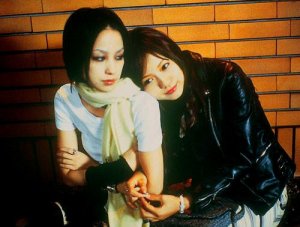
The most devastating thing about this drama (and there are a fair few to choose from) is that you know there's no way it can end happily. It's very premise sets it up to have at best a bittersweet ending.It is extremely well written in this respect, and believable throughout. I found myself truly invested in the characters and the storyline, desperately hoping both Nao and Reina could find safety and happiness on a more permanent basis than constantly being on the run.
I would now spend a paragraph picking apart the faults of this drama, except I'm rather convinced it doesn't have them. Everything from the acting (Ashida Mana may have become my favourite child actor of all time through this drama) to the movie-esque quality to the filming records it down as a must-watch in my book. It truly is once watched, never forgotten.
Esta resenha foi útil para você?
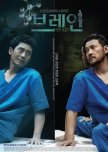
At the beginning of the series, Lee Kang Hoon, the main character, is presented as a typical male lead. Cold and cruel, I was expecting that with the influence of Ji Hye, the female lead, his coldness would 'melt' as he fell in love. This usual formula for k-drama that I've grown so accustomed to turned out not to be the case in Brain. Rather than a romance of any description, the way I see this drama is that it's more of a character study of Kang Hoon, a deeply troubled and, quite bluntly, deeply unpleasant man than anything else. He's portrayed to absolute perfection by Shin Ha Kyun, who executes the many layers to his character flawlessly, yet I wouldn't say at any point his character becomes likeable. There are elements of pity and sympathy evoked by his character, but on the whole his character works to be so memorable and defining in this drama by how unswervingly calculating, vindictive and petty he is. This is actually one of the things I most admired overall. It's a bold move to have a lead character who simply isn't a 'good', kind person that's easy for an audience to root for. It sets Brain apart from a more typical series to have it lead by the kind of character who would be cast as an antagonist in most dramas.
With such a strong lead character as Kang Hoon, there's not a lot of room left for a convincing romance to be built up. As I've said, I was expecting this drama to orbit around the romance between Kang Hoon and Ji Hye, but this really wasn't the case at all. Their romance felt much more like an after dinner chocolate at the end of a meal than anything substantial. I'd have perhaps liked it to have had more resonance in the series as a whole (I'm so used to k-dramas being love and nothing else that I was disorientated...) especially in shaping Kang Hoon's character. The synopsis hints at this but it never really happened to any marked degree in my eyes.
I would say the driving plot behind this drama is the politics of the hospital and the battling of egos amongst the surgeons. This is part way facilitated by how Kang Hoon's unchanging motivation is to be recognized as the best neurosurgeon, regardless of who he has to step on to get there. While I found this whole theme fairly interesting from a character development point of view, it did get tiresome when other plot threads were overlooked in favour of yet another scene of arguments over who was going to get to do the next complex (and therefore prestigious) operation.
As I've hinted at, there are a large number of sub-plots to this drama, many of which had the potential to take this drama from being just good to really excellent. Unfortunately, I felt a lot of them weren't really filled out as far as they could have been. Some, for example the whole role of Seo Joon Suk in the dynamics of the drama, felt like they just fizzled out and I was left wondering why they'd even been introduced at all. It was as if the writers realized they'd added in too much for a span of only twenty episodes only after they'd piled the drama too high with potential plot threads. I wouldn't say this was a major hindrance, as the main plot remained strong as it was and didn't need a lot of back-up, but I still came away feeling a little disappointed that other elements hadn't really received much of a resolution.
With this drama, I think almost inarguably its strength lay in the quality of the cast. Superb performances all-round. This isn't just the main cast, but also the secondary characters who played an important role in giving colour and a sense of warmth to the hospital setting. I especially enjoyed the little romances hinted at and forming in the background throughout the whole drama, which were not a focus but were adorable nonetheless.
Overall, I was addicted to Brain while I was watching it, and got through it back-to-back over three days. Although it wasn't everything I hoped and thought it would be, it definitely had that je ne sais quoi that kept me watching fanatically, compelled to know what happens next. I'd definitely recommend people give it a try. If you're trying to find something a bit different from the usual formulaic Korean rom-com, this might be just what you're looking for.
Esta resenha foi útil para você?
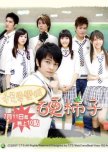
I Want To Become A Hard Persimmon
14 pessoas acharam esta resenha útil
I'll start by saying that the synopsis for this drama does not do it justice. It makes it sound very formulaic and typical, two things it very much is not. No discrediting the synopsis writer, however, because the first few episodes of the drama presents this view of itself as well. To anyone discouraged by this, watch through it and it'll become clear that this is more a guise than anything else. It sets the drama up so you think you know for sure where it's going, like it's something you've seen a hundred times before. That way, you get the full impact when it completely tears this all down and beats out its own track in very unexpected directions.
In terms of the general mood of the drama, for the most part it's light-hearted fun. It has a kind of whimsical silliness (sometimes bordering on that anime-type humour I mentioned earlier, but never crossing the line to where it gets too much) that's really endearing and feel-good. However, that is only part of the story. It has an unexpected, heavier storyline waiting in the wings, one that had me in tears on more than one occasion (though I AM a little sappy...). I loved how this storyline was interwined with the other threads of the drama, as well as the impact it was shown to have on pushing the characters involved into growing as people. It was this, for me, that elevates this drama from simply teen-romcom-romp into something more memorable and adult.
In an attempt at balance, as I'm clearly more than a little biased towards this drama, I will talk about aspects that I found weaker. There is shaky acting from some of the secondary characters. I didn't feel this really impacted the drama too heavily, since the main cast were very impressive (I found Ivy Chen especially captivating and convincing), but I appreciate it can still be a little annoying when secondary characters are over-the-top or wooden. There were also a couple of plot strands that I don't really feel went anywhere or were not developed as far as they could have been. This could have been because the drama's span was too short for all that was packed into it, so some aspects just got lost by the wayside. This is a matter of personal preference whether you will mind this or not. It's more true to life that not everything sees a firm resolution, but I personally like clear endings in dramas, something which IWTBAHP lacked in some regards.
Overall, however, the small minuses are outweighed by a whole bucketful of pluses. I know for me, as soon as I finished the series I was tempted to go right back to episode one and watch it all through again. I would recommend this drama to anyone looking for something fresh, entertaining yet meaningful that will stay with them for a very long time.
Esta resenha foi útil para você?

For the first few episodes, Busu no Hitomi had everything for me. The characters were built to be very likable and human, and there were lots of laugh-out-loud funny moments. However, after these introductory episodes, things started to go a little awry and I found the character's actions and motivations less and less easy to understand as they strayed further from those core values exhibited at the beginning. By the end, I had little emotional investment left in any of them, and the drama just kind of petered out for me with a lackluster, and laboured, ending.
Overall, I wouldn't say this drama was bad, per se. It had a lot of potential, and it was just frustrating that it wasn't realized and optimized. If the characters could have been more consistent, with the story having less complete u-turns and need to throw in unnecessary and often confusing conflict, I would have scored it much higher. As it is, I'd consider it worth watching, and I'm glad I did, but it's probably better to go in without hopes raised too high by how good it appears to be at the beginning.
Esta resenha foi útil para você?
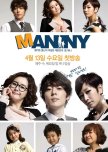
In any case, I'll start with the positives. Manny, more than anything, is a comedy. It's light and funny, with many laugh-out-loud moments, and most "conflicts" tend to be resolved in the space of a single episode, at least in the beginning. The main couple in Yi Han and Do Young are obvious from the start, but they fail to steal the show in favour of cutesy Jung Min, his divaish older sister Eun Mi and they're even more divaish aunt, Janice. I'm a fan of secondary characters being developed individuals in their own right, so this worked for me. I especially enjoyed that the kids weren't just plot devices, but had strong personalities of their own.
However, this is where the strong personalities end. Yi Han and Do Young, our main leads, are hollow archetypes at best. Yi Han is a Superman-type figure who can fix ANYTHING. One of the basics about any conflict in a story is that it should be believable to the audience that things really won't turn out for the best. This isn't true at all in Manny, because Yi Han is interminably capable and you're never in doubt he can solve anything with some wise words and perhaps a flashback to his old baseball friend in America. With Do Young, our female lead, it feels like there were efforts at development of her character, but to the point where there's two competing sides in her that make her confusing to watch and difficult to empathize with. She switches between stressed out single mother, still not having bounced back from what can be assumed to have been a messy divorce, and love-sick, infatuated teenager, complete with doodling her crush's name in her notebook. Needless to say, put Yi Han and Do Young together and the chemistry is far from sizzling.
As I mentioned at the beginning, the percentage of this drama is good. It never reaches any startling heights, but then that's not what it was aiming for. The drama seemed to know its place as a standard comedy. But then towards the end, it's like the it's been told to grow up and act its age because suddenly there's a barrage of seriousness and an emotional overflow that is so unfitting with the ambiance established up until this point. The characters haven't been built to be people you care deeply about, which is fine in a comedy, but tedious when these same characters are thrown into situations where emotional investment is a prerequisite if you're not going to lose the audience entirely. Without this sudden turn in tone, the drama would have been a solid watch. With it, the experience was, if not ruined, at least soured.
Esta resenha foi útil para você?
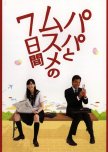
For a short drama, Papa to Musume succeeds in being just about entertaining throughout. You get a good few comedy situations which are inevitable given the premise. More than that, it's a drama with a bit of a preachy moral about seeing things, in the most literal sense, from another's perspective.
Yes, it's cheesy. Yes, it doesn't really stay with you long after you've watched it. But the cast are likable and convincing in their roles (even though I think it would have been better if both father and daughter were given more time to establish themselves in their original characters before the switch happened, so the contrast would have been more apparent), and the overall premise was quite neat. If I had to give my main criticism, it's that the drama, in it's limited span, didn't go as far or deep as it potentially could have to tell what could have been a much more compelling story.
Esta resenha foi útil para você?

Starting with what was positive about the series, the real bones of What's Up Fox and what makes it so deliciously addictive for the most part is the strength of the characters. Their connections and interactions with one another really are a joy to watch and they really feel like people who have known each other for most of their lives. This is particularly true for our lead pair, Byung Hee and Cheol Su. The fun interactions between these two manage to be adorable in some places, and then sizzle with chemistry in others. However, this chemistry was somewhat dampened by the drama's insistence on reminding the audience regularly of the awful age gap between the couple. This was probably the biggest irritant for me in the series.
One of the major themes of the drama, unsurpisingly, is age-gaps, and the way it was portrayed between Byeong Hee and Cheol Su prevented me from investing fully in the pairing. I have no issue with age-gap relationships at all. In fact, I tend to find them pretty cute; unlikely couples who have overcome the odds. But What's Up Fox fixates on the age difference between the lead couple to an unnecessary degree. We see Cheol Su acting like a petulant child when he can't have Byung Hee the moment he decides he wants her. We see Byung Hee reminiscing to instances of herself taking care of Cheol Su when he was just a kid. We see the somewhat exaggerated outcry from the families of the couple. I get that the drama wants the 'shock factor' by putting the emphasis so firmly on the nine whole years between the main couple. But for me, this just detracted from how much I actually wanted the couple of get together. I found myself thinking that the families were actually right and the whole set-up was just a bit creepy. I wish instead the the drama had taken the more sensible (if less drama-worthy) angle that they are both adults, so why should a few years between them stop them being a couple?
We see age difference as a recurring theme again in the two subplots concerning Byung Hee's mother and her sister. I was worried when it first became apparent that these subplots, almost entirely removed from the main plot, were going to get a fair amount of screentime. I've seen dramas where the sub-plots have almost taken over from the main, but I felt the right balance was struck in What's Up Fox. The sub-plots served to explore various types of age gaps, which added a richness to the drama, as well as providing a break from the main action. I will say, however, that whilst I really enjoyed Byung Hee's sister's side-story, I didn't really engage with that of Byung Hee's mother at all. It felt haphazard and it came too suddenly to a stop. I was left unsure what the writers' had been trying to say with it in the first place and if it had just been there to fill air-time.
Dipping back into the numerous positives of this drama, one of my favourite things about it was its candid approach to relationships. It's a Korean drama that openly discusses sex. It's almost worth watching for that novelty alone. This isn't a drama where the love is a simple, pure one consummated with a chaste peck. It admits that couples have sex and that's normal and basically a good thing. Along this line, I particularly enjoyed Byung Hee's insurmountable ability to imagine and write erotic material whilst herself still being a virgin. It added layers to her characters, whilst also creating a lot of laugh out loud moments.
Overall, I enjoyed What's Up Fox. There were a handful episodes in the middle that I watched back-to-back because I was so addicted. I was so disappointed therefore with the ending. It felt to me that really kicked down everything that had been built up to that point. The relationship between the leads just deteriorated for the sake of an extra spurt of drama on the homestretch, and it made me doubt whether they were really suitable for each other after all and if the age difference actually was too much to conquer. It was a self-defeating move by the writers', and it left me feeling less positive about the drama as a whole. That being said, it's not enough for me to actively discourage people from watching What's Up Fox. For the majority, it's fun, refreshing and enjoyable. There were just a few areas where, for me at least, it let itself down.
Esta resenha foi útil para você?

